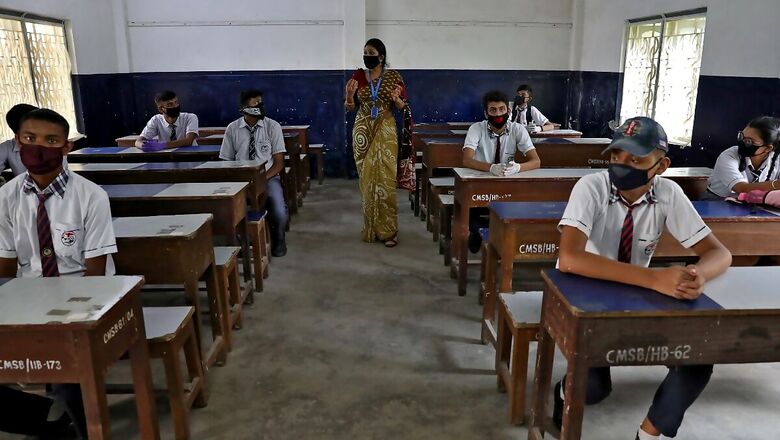
views
The New Education Policy (NEP) 2020 has introduced major reforms in school education that detach high stakes from board examinations, introduce internship in vocations for class 6, and reconfigure the pedagogical structure for school education.
The NEP 2020 was announced on Wednesday at a press briefing attended by Human Resource Development (HRD) Minister Ramesh Pokhriyal and Information and Broadcasting Minister Prakash Javadekar. Secretary of Higher Education Amit Khare and Secretary of School Education and Literacy Anita Kanwal made the major announcements.
The curricular and pedagogical structure of school education will be conceptualised to meet the developmental needs and interests of learners at different stages of their development. With an emphasis on Early Childhood Care and Education, the 10+2 structure of school curricula is to be replaced by a 5+3+3+4 curricular structure corresponding to ages 3-8, 8-11, 11-14, and 14-18 years respectively.
“This will bring the hitherto uncovered age group of 3-6 years under the school curriculum, which has been recognised globally as the crucial stage for development of mental faculties of a child. The new system will have 12 years of schooling with three years of anganwadi/pre-schooling,” said a statement from the ministry.
The National Council for Education Research and Training (NCERT) will develop a National Curricular and Pedagogical Framework for Early Childhood Care and Education (NCPFECCE) for children up to the age of eight. The planning and implementation of ECCE will be carried out jointly by the Ministries of HRD, Women and Child Development (WCD), Health and Family Welfare (HFW), and Tribal Affairs.
This policy was made after wide consultations with MPs and parliamentary committee members. The officials and committee members approached 2.5 lakh gram panchayat for suggestions. The draft was translated in 22 languages.
The policy has focused on making board examinations less stressful, with no high stakes to it. There can be a modular system introduced and can be held twice. “Board exams can be divided into two -- objective and descriptive -- with focus on knowledge application and not encourage rote learning,” said Kanwal.
As per the ministry statement, all students will take school examinations in Grades 3, 5, and 8 which will be conducted by the appropriate authority. Board exams for Grades 10 and 12 will be continued, but redesigned with holistic development as the aim.
The NEP 2020 has proposed a shift from summative assessment to regular and formative assessment, which is more competency-based, promotes learning and development, and tests higher-order skills, such as analysis, critical thinking, and conceptual clarity.
A new National Assessment Centre, PARAKH (Performance Assessment, Review, and Analysis of Knowledge for Holistic Development), will be set up as a standard-setting body. All state boards will have guidelines to ensure how to explore the child’s abilities and set benchmarks. This will track the outcomes of literacy and numeracy.
There will be a holistic report card prepared for the child, which will have three three kinds of assessment.
“First, the child will assess his/her performance. Second, classmates and third, their teachers. The report card will have the knowledge of skills the child has acquired by the time he leaves class 12.”
The policy also makes integration of vocational education from class 6 for the first time in this policy. There will be internships for students (craftsperson). "There will be bagless days when one can go for vocational studies for ten days,” said Kanwal.
What the new structure will look like
According to the NEP 2020, Restructuring of the school curriculum and pedagogy will take place in a 5+3+3+4 Design. The curricular and pedagogical structure of school education guided by a 5+3+3+4 design corresponding to the age ranges of 3-8, 8-11, 11-14, and 14-18 years, respectively will consist of:
- Foundational Stage (in two parts, i.e. three years of Anganwadi/pre-school + two years in primary school in Grades 1-2; both together covering ages 3-8): with flexible, multilevel, play/activity-based learning and the curriculum and pedagogy of ECCE.
- Preparatory Stage (Grades 3-5, covering ages 8-11): with introduction of experiential learning across sciences, mathematics, arts, social sciences, and humanities.
- Middle Stage (Grades 6-8, covering ages 11-14): with a subject-oriented pedagogical and curricular style.
- Secondary Stage (Grades 9-12 in two phases, i.e., 9 and 10 in the first and 11 and 12 in the second, covering ages 14-18): with greater depth, greater critical thinking, greater attention to life aspirations, and greater flexibility and student choice of subjects, and option to exit at grade 10 and re-enter at a later stage in grade 11.




















Comments
0 comment